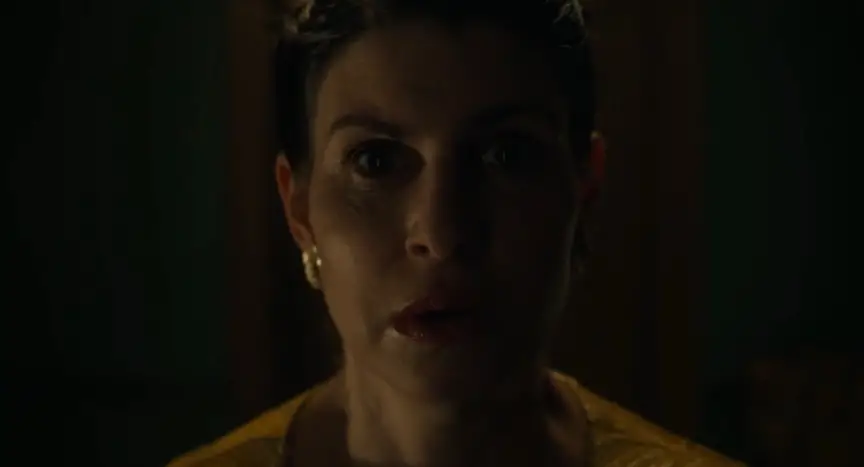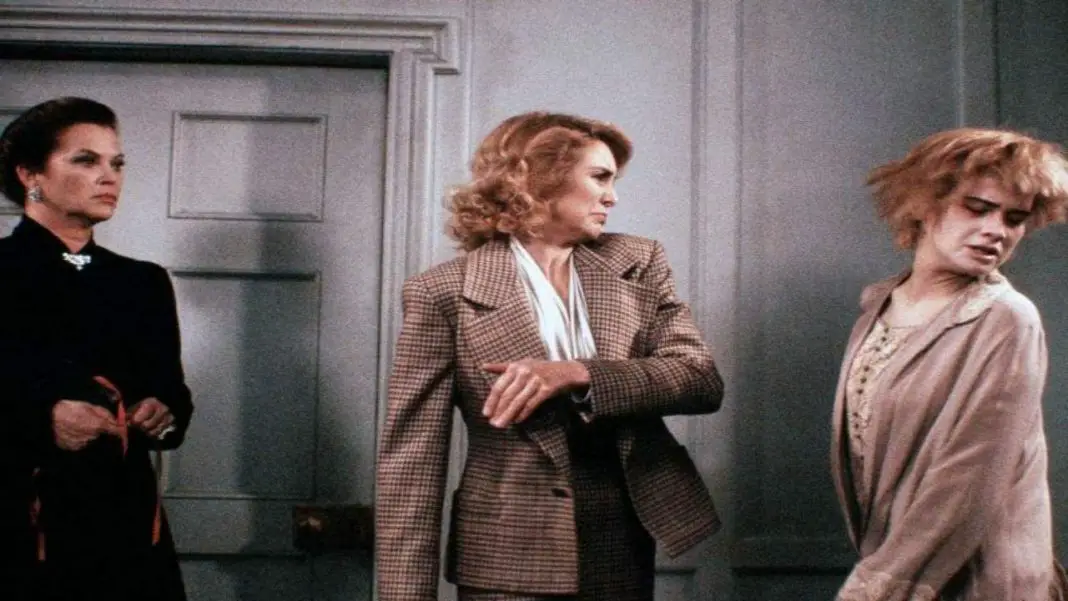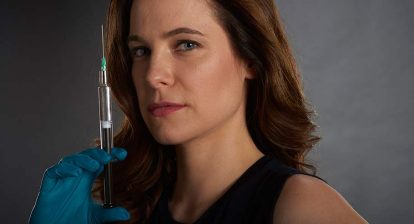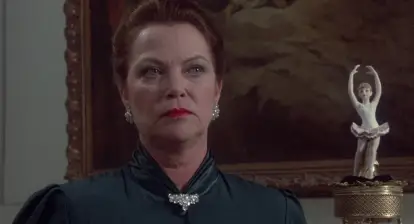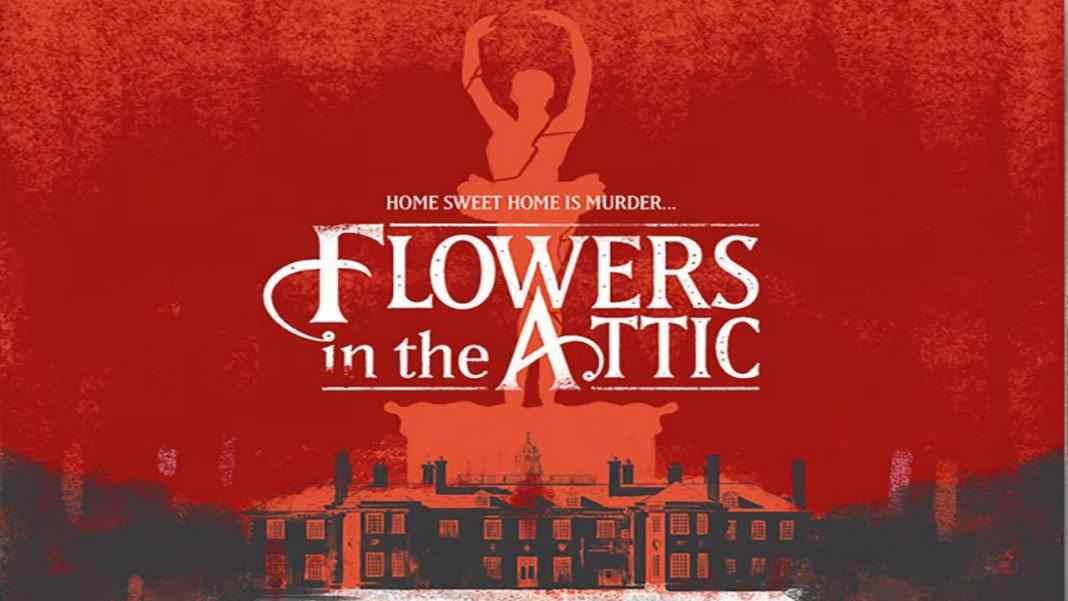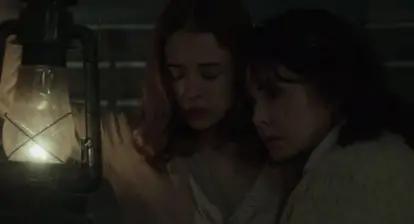Incest. Poison. Revenge. Just a few elements expected by fans of V.C. Andrews that are delivered in spades in the most recent, four-part adaptation of her work. The first three parts are rather successful, albeit adding in extra plot and characters not included in the source material that some hardcore might to reject. Nevertheless, from my own perspective as a hardcore fan, these additions do not hamper the story and could have served to enhance the original book. Unfortunately, the fourth part deviates too far from the novel in a way that contradicts plot points that are revealed in the celebrated Flowers in the Attic and subsequent sequels. In order to understand what went right and wrong about this latest Lifetime adaptation, we need to go back to the release of Garden of Shadows, the prequel from 1987 on which Flowers in the Attic: The Origin is based.
Released in 1979, Flowers in the Attic was a huge success for new author V.C. Andrews (aka Virginia Cleo Andrews). Her debut novel, about four children locked away by their beautiful mother and cruel grandmother, was an international bestseller. Three incredibly successful sequels were released, and the author took her place amongst the great horror writers of the era. Still, the tales penned by V.C. Andrews became their own kind of genre. She mixed elements of horror, drama, southern gothic, and fairytales in order to weave a tapestry that enthralled millions of readers. Other novels were also released by V.C. Andrews that were just as popular; titles My Sweet Audrina, as well as Heaven and Dark Angel.
Also See: V.C. Andrews’ Landry Series is Most Successful Lifetime Adaptation Yet
Then, suddenly the author passed away from cancer, and yet, a new novel was mysteriously released under her name. In the preface, the publishers revealed a writer had been carefully selected to finish incomplete manuscripts from the late author. Among the first was a prequel novel to the Dollanganger series that began with Flowers in the Attic. This prequel novel was Garden of Shadows and would center on known events from the point of view of Olivia, the cruel grandmother that punished her grandchildren for the sin of existing as a result of the incestuous relationship (half-niece and half-uncle) between their mother and father. The history of the prequel novel will continue in this article, but for the moment, let’s focus on the Lifetime adaptation.

Flowers in the Attic: The Origin is a four-part miniseries, released by Lifetime in 2022, that is based on the events in Garden of Shadows. Viewers follow Olivia (Jemima Rooper), a woman in the 1920s who is self-reliant and ahead of her time. She meets the wealthy Malcolm Foxworth (Max Irons) and accepts his proposal of marriage. After being whisked away to his mansion, known as Foxworth Hall, she realizes Malcolm is a selfish and sadistic man. In addition to preceding the novels, this miniseries is clearly intended as a prequel to Lifetime’s 2014 release of Flowers in the Attic starring Heather Graham and Ellen Burstyn, which was one of the network’s highest rated premieres at the time. While that success led to immediate adaptations of the sequels, Garden of Shadows was delayed. Incidentally, this delay is one of the factors leading to where The Origin went wrong.
Spoilers Ahead. Part One is called The Marriage and successfully develops the sordid relationship between Olivia and Malcolm. After leaving her father (Harry Hamlin) and devoted cousin, John Amos Jackson (Paul Wesley), she becomes the mistress of Foxworth Hall. She makes an enemy out of a stern housekeeper (Kate Mulgrew) and finds a friend with a hesitant maid (T’Shan Williams). Olivia discovers the infamous attic and notorious swan bed belonging to Malcolm’s runaway mother, Corrine. Here, Olivia is repeatedly sexually assaulted by her husband until giving birth to a son. Malcolm, however, wanted a daughter as a namesake to his mother. He seizes his chance when his father, Garland (Kelsey Grammer), returns with his pregnant young bride Alicia (Alana Boden). The women develop a bond after Malcolm rapes his stepmother, leading to the death of his father. Additionally, this leads to another pregnancy for Alicia and a newfound bitterness for Olivia.
The second and third installments (titled The Mother and The Murderer, respectively) continue the story, as Alicia is locked in the attic, foreshadowing what would happen years later with Olivia’s grandchildren. Malcom and Olivia claim the child as their own with Alicia’s consent. Alicia comes to despise the couple, and once the birth of daughter Corrine occurs, she escapes with her young son. Her son will later grow up to be Christopher (Callum Kerr), who we know will fall in love with his half-niece (Hannah Dodd) and produce four children to ultimately be locked away. The big shock in the prequel, however, is that their relationship is further revealed to be that of half-siblings. Other subplots newly developed in this series include the revelation that Malcolm is the father of the maid’s daughter and Olivia’s other son comes out as gay while in a biracial relationship.
Jemima Rooper is well-equipped to take on the role of Olivia Foxworth. She dips between the aloof coldness required of the future grandmother, while also easily conjuring the necessary vulnerability of Olivia revealed from the prequel novel. Her counterpart, Max Irons, is a perfect Malcolm Foxworth. Irons is charming, handsome, intimidating, and sinister. The acceptance of this adaptation relies upon the casting of this diabolical coupling, and the actors are more than up for the challenge.
In terms of casting, there could not have been a better choice than Hannah Dodd as Corrine. In addition to finding extra depth to a character so concerned with being shallow, Dodd’s look and style are a perfect homage to Heather Graham’s portrayal of the same character in the earlier adaptations. A clear and welcome reference to The Origin being a prequel to the earlier Lifetime adaptations. Meanwhile, Callum Kerr charismatically demonstrates all the elements needed for the gallant Christopher and Alana Boden captures the ethereal, yet determined qualities needed for Alicia. Finally, T’Shan Williams (as the broken Nella) and Kate Mulgrew (as the sinister Mrs. Steiner) bring solid contributions with their “new” characters introduced in this version of events.
Related: Back to the ’80s: Flowers in the Attic Original Script Ending
New characters are just one aspect of the changes The Origin makes to the source material. Ultimately, their additions are not particularly essential to the narrative. Their inclusion was likely developed to justify stretching out The Origin into four parts. Nevertheless, including these characters and their subplots does not detract from the first three parts. Their inclusion gives the main characters a logical reason to voice motivations that were internalized in the source material. Garden of Shadows is told from the viewpoint of the introspective Olivia, and therefore, the action is amped up a bit in order to keep new audiences engaged. Ultimately, new characters are only a portion of the changes in The Origin.
In fact, the first three installments triumph in balancing the changes from the book while improving some of the novel’s shortcomings. One example is the treatment of Corrine. Fans of Flowers in the Attic know Corrine’s tendency to use poison to get what she wants, no matter the cost. Interestingly, a new sequence is added that shows this facet of her character being developed long before she became a mother. Corrine’s inspiration for using poison at a young age is a delicious way to add suspense to the adaptation to solve her problems. This is a complete change from Garden of Shadows; however, this addition manages to create a domino effect that ticks off many plot points that need to happen. At the same time, it is a horrifyingly fun wink to fans of the novels and is completely true to the essence of Corrine.
Part four is, unfortunately, where everything falls apart. Parts one through three accumulate differences that give a little pizzazz to the story while remaining true to the required narrative. There are thrilling chase sequences, a murder is added, traumatizing abortions, and racial conflicts are explored alongside gay rights in the early half of the 20th century. Despite the inevitable criticisms that certain components are panhandling to “woke” culture, such as inserting hot button topics, The Origin handles these portions with sensitivity and ultimately enhances the connection to modern audiences. And, most importantly, none of the changes negatively affect the trajectory of the series until Part Four, titled The Martyr.
The Martyr opens after a surprising murder and alongside the dramatic revelation of the romance between Corrine and Christopher. Playing out with more intensity than the novel, the opening of part four is the final alteration that will work for The Origin. The fourth installment collapses under Olivia’s failed attempts to murder her husband, the unlikely burgeoning stardom for Nella, and what ultimately becomes a lacking payoff for the “new” characters. The fate of Mrs. Steiner could have been the ingredient needed to explain Olivia’s later devotion to both Malcom and religion; however, the adaptation sidesteps this notion and quickly resorts to making the couple enemies again. Meanwhile, the revelation of Celia (Evelyn Miller) is anticlimactic, while Nella proves to be little more than an illogical reason for Olivia to turn away from people.
Still, the two biggest issues of The Martyr remain. The first is regarding the character of Joel (Luke Featherston). Joel has come out to his accepting mother and run off with local mechanic Harry (Jordan Peters). This is problematic as his fate has dramatically changed from the source material. Based on the closeness between Joel and Corrine in this adaptation, there is no explanation given as to why a destitute mother with four children would not turn to her loving brother for help. Especially before turning to the mother and father that she hates (one of which, you know, she tried to poison).
Did You Know? Wicked Horror TV Has Classic and Independent Horror Films Available to Stream for Free!

The second is regarding the character of John Amos Jackson (inexplicably referred to by Olivia as “Amos” in this adaptation). His full name was given in the first part, so there is no doubt that he is the cousin of Olivia, who is revealed in Garden of Shadows to be the catalyst for all the events that occurred in Flowers in the Attic and later novels. The problem regarding his character in The Origin, of course, is that he uncharacteristically attempts to rape Olivia before she kills him with a letter opener. In addition to being an important part of the denouement in Flowers in the Attic, he is needed to contaminate Bart Jr.’s mind in If There be Thorns. Therefore, killing John Amos unravels the trajectory of the entire series. Most importantly, Garden of Shadows reveals that he is the one to convince Olivia to lock up the grandchildren.
Dozens of series were released after the death of Virginia Andrews and long since has the mystery of the ghostwriter been solved. Andrew Neiderman (author of The Devil’s Advocate and Pin) was splitting his time between his own works and capturing the style of V.C. Andrews. At the time, there were debates among fans about which novels were partially written by Virginia and which were solely by Neiderman. Fans mostly accepted that Garden of Shadows was created by both authors, but in recent times, it has begun to seem as though that prequel was likely written solely by the ghostwriter. This is most evident with various contradictions that occur throughout the novel. One could chalk it up to an unreliable narrator, as these are told in first person; however, the release of The Origin demonstrates that these mistakes are often less a character’s fault and due more to the fault of the creators.
Don’t Miss: Blu-ray Review: Flowers in the Attic [U.K. Release]
Executive producer, Paul Sciarrotta, revealed in a recent interview with Forbes that the filmmakers relied heavily on Neiderman’s input throughout the making of the adaptation. Other articles have identified that certain character fates and situations were fact-checked with the ghostwriter, and Neiderman confirmed that these changes would be acceptable. This is puzzling as Neiderman primarily wrote Garden of Shadows in which John Amos was revealed to be the reason the kids were hidden away. Furthermore, the whole occurrence is bewildering as an If There Be Thorns movie, where the character features most prominently, was released by Lifetime in 2015. Even if Neiderman had not been consulted, the filmmakers should have at least watched their network’s adaptation to realize this specific character needs to survive.
As a fan of V.C. Andrews, I am happy to add the DVD of Flowers in the Attic: The Origin to my collection. The DVD does not contain any special features, but the first three parts are worth watching. There are changes that some fans will resist while others will embrace. Personally, the first three segments were worth the watch and thrilling to watch come alive. To see all that potential crumble in the fourth part was sorely disappointing. Newcomers will be held in shocked suspense as each scene unfolds within the twisted family drama. Those unfamiliar with the source material will be less disappointed and might even thoroughly enjoy how everything plays out in The Origin. Of course, once the new fans continue to the following films they will soon be lost and confused to see certain characters miraculously come back to life.

Flowers in the Attic: The Origin will be released September 13, 2022, on DVD.
